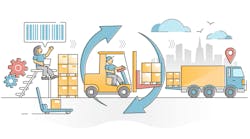Thanks to the big push by retail giant Wal-Mart Stores Inc. and the U.S. Department of Defense and the attendant marketing hype, shippers could be excused for thinking that radio frequency identification (RFID) begins and ends with passive tags at the case and pallet levels. And yet, while consumer goods companies continue their elusive search for return on investment from their RFID investments, very significant savings are already an accomplished fact for companies using the less-publicized but more robust active RFID technology.
NYK Logistics (www.nyklogistics.com), a third-party logistics provider (3PL) located near the Port of Los Angeles/Long Beach, maintains a 70-acre yard and transload facility, encompassing 1,100 parking slots and 250 dock doors. Activity in NYK's yard includes 50,000 inbound ocean freight containers and 30,000 outbound trailers annually. Last fall, at the height of the peak season, NYK managed 1,840 gate moves in a single day. To call NYK's yard a high-velocity environment would be a gross understatement.
Even so, it took the West Coast lockout at the end of 2002 to convince NYK it needed a technological boost in its ability to track and trace the comings and goings of each of the containers and trailers in its yard. At the end of the 10-day lockout, there was such a backlog of freight that, as Charles Kerr, equipment control manager for NYK, remembers, the first wave of freight basically took a great portion of the domestic equipment back east, resulting in equipment shortage.
“When we dug ourselves out of that, we said to ourselves, ‘This can never happen to us again.' So we set out to fix it,” says Kerr.
“Fixing it” involved adopting tracking-and-tracing technology from WhereNet Corp. (www.wherenet.com). In addition to purchasing more than a thousand WhereTags — small, active radio transmitters affixed via a clamp to every container and trailer that enters the yard — NYK also implemented WhereNet's real-time locating system as well as its rules-based yard management system (YMS) software.
Previously, NYK relied on traditional data entry to capture location of the containers and trailers into PCs on a batch basis — a very labor-intensive process. “We were out doing yard checks with clipboards, and checking whether the containers were in fact where the drivers said they had left them,” Kerr says. “We went from a very hands-on, keypunching, batch mode to a totally live and accurate data environment.”
NYK Logistics was up and live with the wireless location technology in July 2003. The solution includes 35 wireless locating access points (antennas) mounted around the yard.
Kerr explains how the system works. “In a traditional yard, the driver comes in, gets a gate pass from a guard, is told to drop off the container at a specific location, and after he drops it he goes to a window to get his paperwork signed. If he's going to do a double transaction, he then goes to another location, picks it up and then he goes to the gate, shows his paperwork to the guard, and out he goes.”
In the new environment, though, that process is greatly shrunken, Kerr continues. The driver never goes to a window. The streamlined process, he explains, is analogous to a Hertz Gold Club member at an airport. “When a trailer or container comes to the gate, the driver knows that he's here for a double transaction. An operator standing in the lanes at the gate has a handheld device from Symbol Technologies, tethered to a printer, just like at the airport. The drivers don't have to stop at the window and leave their cabs any more.”
NYK has reduced the amount of time spent by drivers on-site to complete a double transaction by 66%. What's more, it has reduced yard inventory of trailers and saved up to 40-60 parking spots in the yard at any given time. Other benefits include:
- eliminating 100% of costs associated with manual yard searches and data collection;
- improving gate personnel productivity by 50%;
- increasing daily throughput of the yard by 38% during last year's peak season;
- achieving a higher level of customer service, resulting in increased revenue through new business.
Earlier this year, retailer Target Corp. recognized NYK Logistics as its Deconsolidator of the Year. LT



